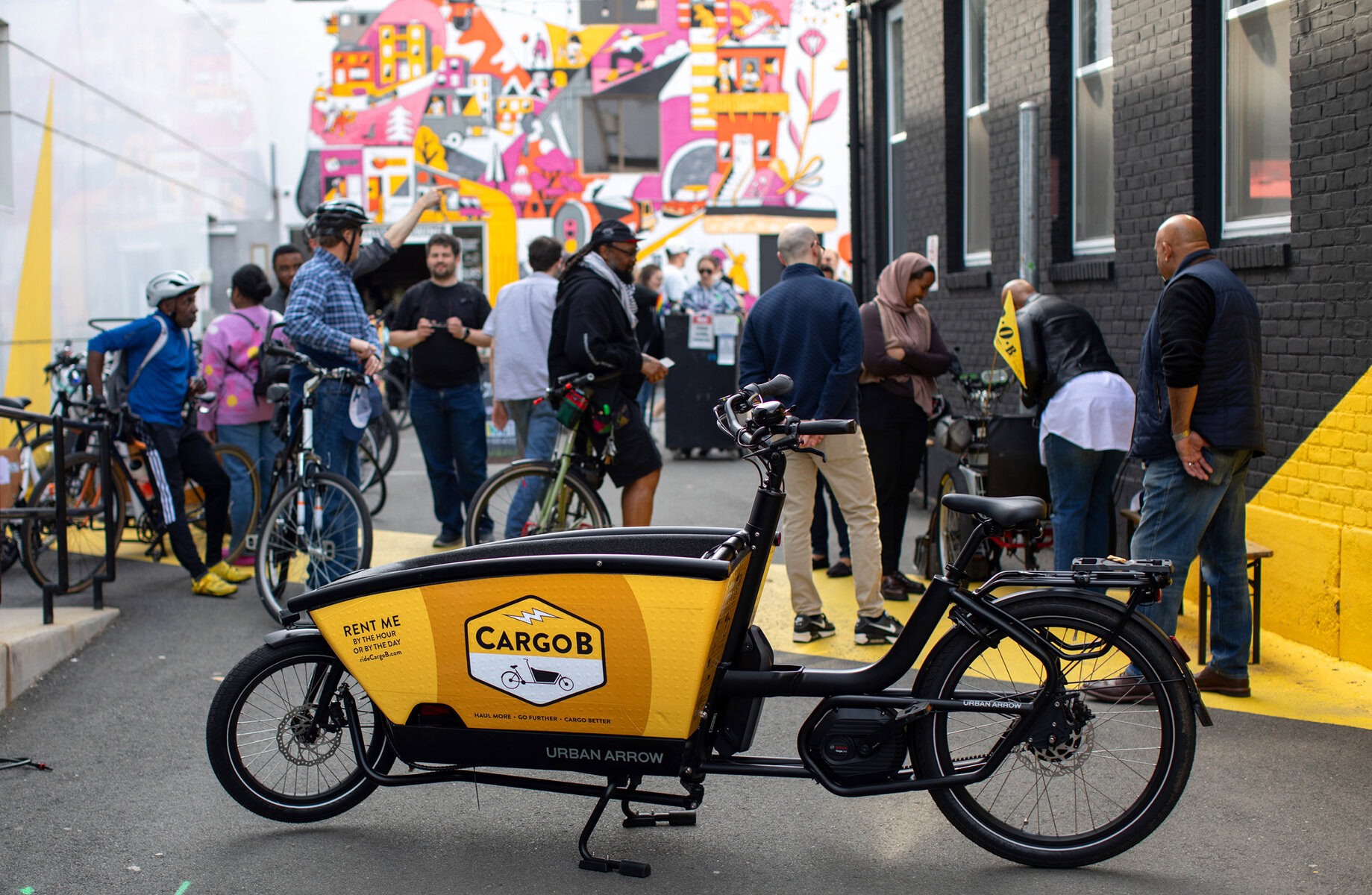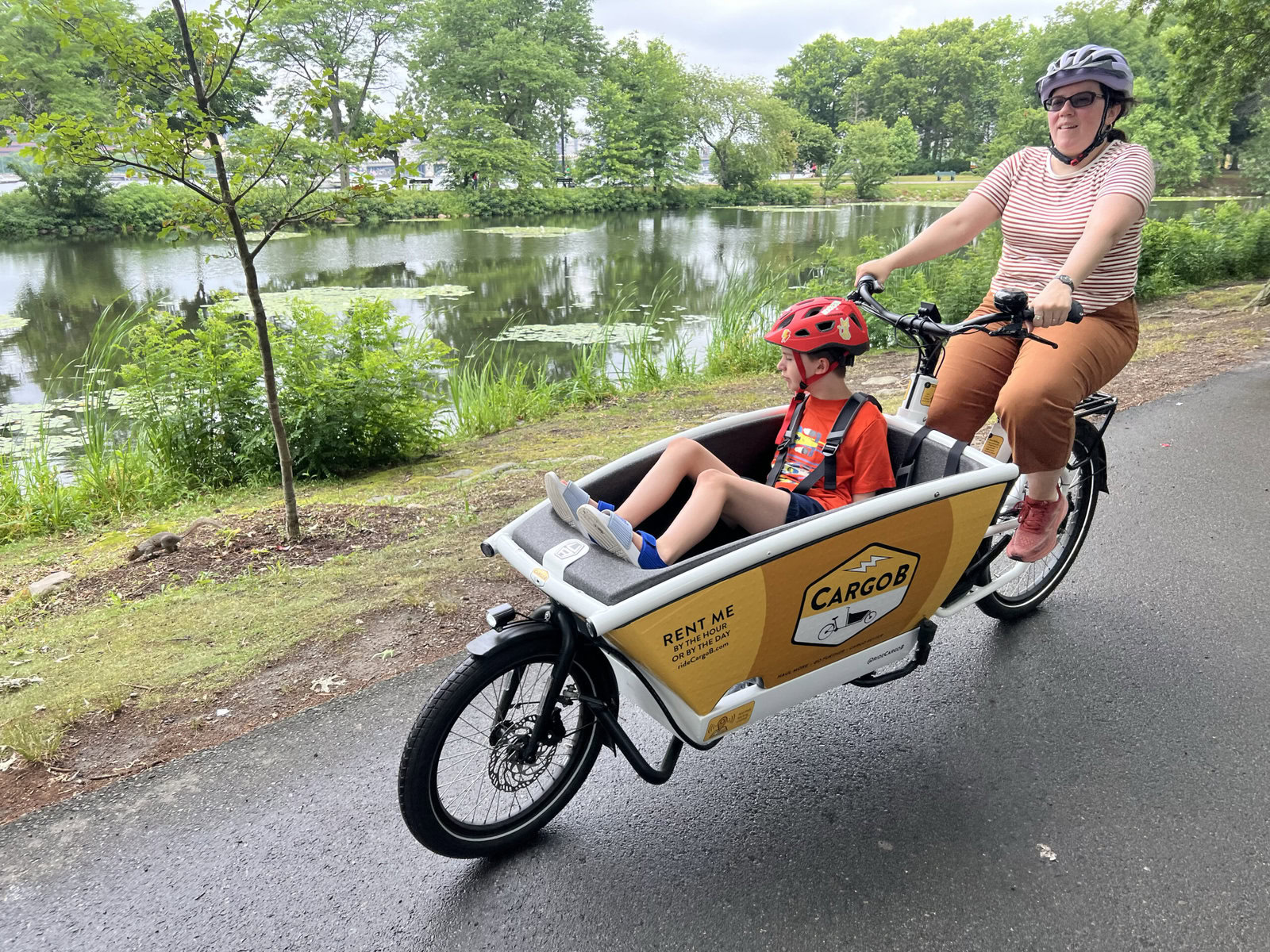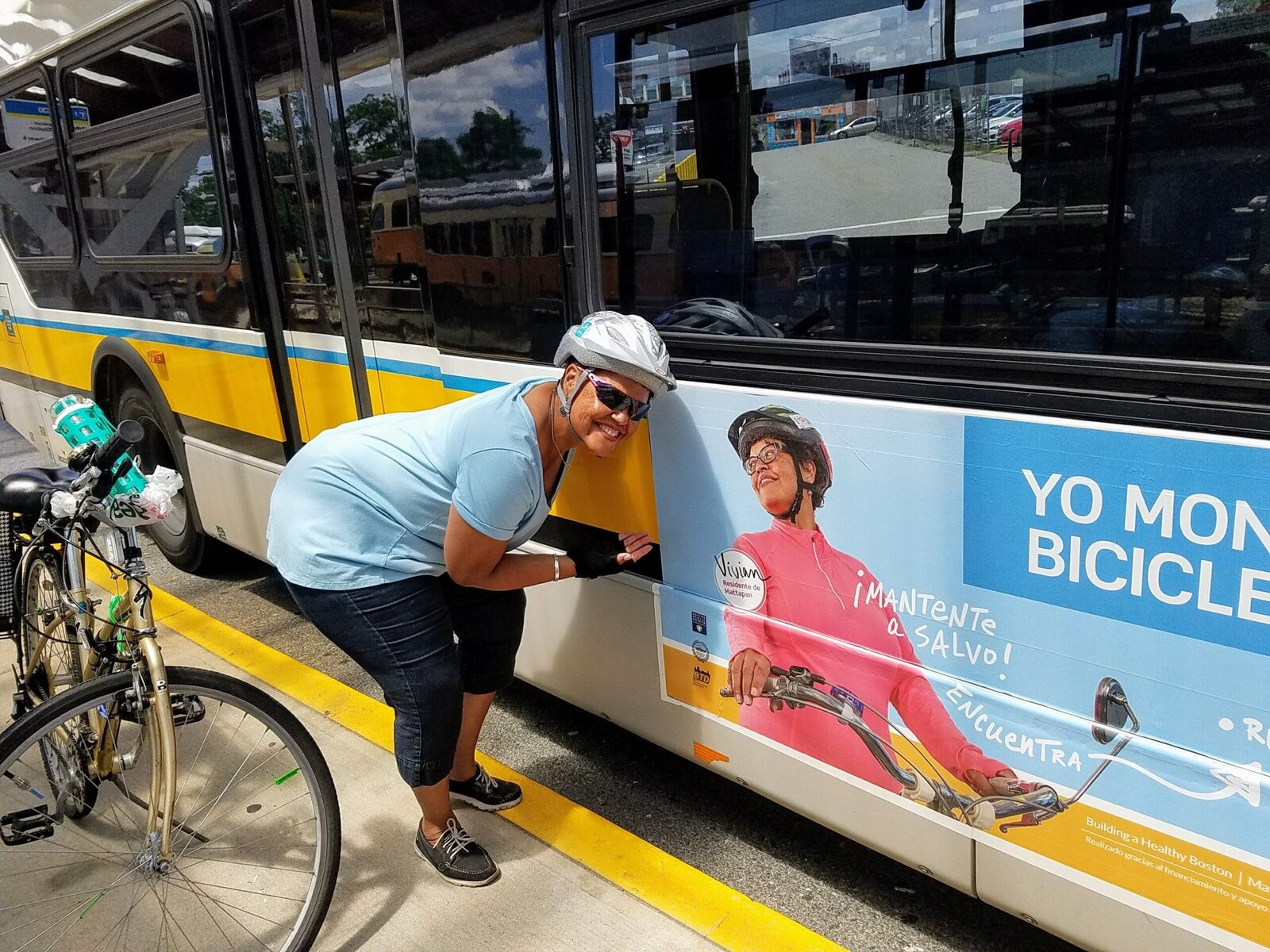

Our Electrifying World is a series about how electrification is creating a more sustainable energy transition. It is sponsored by Rewiring America.
This story has been co-published by Reasons to be Cheerful and the Outrider Foundation.
Last December, Tim Reardon zipped through the busy holiday traffic of his Boston neighborhood of Jamaica Plain, transporting gallons of eggs, milk and heavy cream for his yearly Christmas eggnog extravaganza, all on just two wheels.
Reardon, an avid cyclist who doesn’t own a car, can be spotted once a month transporting goods like Christmas trees and rugs — sometimes along with his daughter — in the yellow front cargo compartment of a rented electric bike. For Reardon, biking turns these mundane errands into thrilling adventures.

“It’s a form of freedom,” he says. “What moves me is my feet and this little motor that’s in there. I’m not inside a box and I’m not trapped in with everybody else.”
Reardon rents bikes from CargoB, which launched in spring of 2024 with a small fleet in the Boston area. It’s one of a growing collection of on-demand cargo bike shares across the country. Especially in dense urban areas, cargo bikes make transportation faster and more accessible, making it easier to avoid rush hour and save money by reducing car use. These bikes usually have electrical assistance, making hauling heavy loads easier.
In the U.S., cargo bikes, especially electric ones, are in their infancy, but their popularity is on the rise.
Price is a key factor. Renting an electric cargo bike from Boston-based CargoB is about $10 to $12 cheaper per hour than renting a car. CargoB charges by the minute, so Reardon only pays for what he needs.
But buying a cargo e-bike is another story. The cargo space makes such bikes a practical choice for families, but the $6,999 price tag is a barrier for many.
Melissa Bopp, a professor of kinesiology at Pennsylvania State, has been working on a survey on the use of cargo bikes — both electric and regular — in the United States and Canada to understand reasons for use, barriers, storage, safety habits, costs and more. She received 627 responses during spring 2025 and is currently analyzing the response data.
According to preliminary results, almost 80 percent of those surveyed bought their cargo bike new, while 18.7 percent bought one used. Only 0.2 percent rented or borrowed one.

More than 50 percent reported using a cargo bike at least four times a week for errands or giving their children rides to school and other activities. Most saw unsafe roads and weather as obstacles to more frequent use.
Around 70 percent of riders spent $200 or less in repairs, accessories and maintenance over the course of a year, compared to an average cost of $10,965 to own a car in 2024 according to the American Automobile Association.
Jimmy Lizama, a long-time bike advocate, has never owned a car. Lizama is the founder of the Los Angeles nonprofit Re:Ciclos. Re:Ciclos works to increase access to cargo bicycle technology and empowerment of youth in Black and brown communities. He used to be against e-bikes. But as his son — Lizama’s usual cargo — grew bigger, the hills of Los Angeles proved impossible to climb without a motor. Having experienced the difference, Lizama admits that e-bikes make biking more feasible in the city.
“We’re going from the idea that you are self-contained in a box that is air-conditioned, that goes 35 miles, 60 miles an hour, and to compete with that consciousness is very, very, very difficult,” Lizama says. “We have to do anything we can right now to create bridges for folks to understand that mobility can be a lot more responsible, fun, easy and healthy.”
Weighed down by negative news?
Our smart, bright, weekly newsletter is the uplift you’ve been looking for.To help achieve that, Re:Ciclos builds cargo and regular bikes, takes on interns and is working on partnering with the city’s transportation agency by repairing bicycles abandoned on their system and redistributing them to people in need. While Lizama wants to encourage human locomotion over electric bikes, Re:Ciclos does make electric bikes. He encourages those wanting e-bikes to consider cargo as “potentially the best technology to replace cars especially in the sprawl of Los Angeles.”
However, being a grassroots organization can make funding hard to come by. Right now, Re:Ciclos is only working on two bikes, versus a previous high of 50 per year.
E-bike lending is also complicated due to Re:Ciclos’ focus on recycling, Lizama notes. “Recycling batteries is a whole thing that we’d love to engage in, but without proper expertise and facilities to maintain and store batteries, it can be potentially a dangerous situation,” he says. “Equally as important is growing our own capacity to be able to work across e-bike systems to mix and match toward salvaging old systems and not just trashing e-bikes that simply need some repair.”
Back in Boston, CargoB co-founder and CEO Dorothy “Dot” Fennell chose the for-profit start-up model for its cargo e-bikes.

Fennell, who previously worked in city transportation planning, says having a professional front with an app, insurance and the resources to maintain the bikes helps attract new customers, partner businesses and cities. She and co-founder Zack DeClerck also go to every Open Streets event in Boston.
“It becomes kind of a spectacle, and I’m happy to be the carnival barker bringing you in [on] this wacky thing,” Fennell says. “And if I got that hook, you’re like, ‘Oh wait a minute, I can take [a cargo bike] out to the grocery store or I can take it down to the park.”
That approach is working, according to Fennell. CargoB is generating revenue and has 700 subscribers, a quarter of whom are regulars. People are also asking for bikes in more locations.
However, there’s a long road ahead. For one thing, Fennell and DeClerck have not yet been able to take paychecks. And looking at the future of cargo e-bike shares more broadly, Fennell isn’t sure they could be successful in less dense parts of the country.
CargoB focuses on “short-distance trips in cities, because that’s where you have all these different land uses in one place,” Fennell says. “The best way to make them all mesh together is having a vehicle that’s right-sized to move in between all these places.”
Right now, they have seven cargo e-bikes, with 10 to 15 more that will launch by the end of 2025. Fennell dreams of building out CargoB across the Northeast and the Midwest.
Another critical expansion need is beyond the most common cyclists: “MAMILs,” an acronym for “middle-aged men in Lycra.” Boston Bike Mayor Vivian Ortiz is especially invested in making biking more inclusive, and she thinks cargo bikes could help.

Ortiz lives in the Mattapan neighborhood, which is 72 percent Black. Mattapan is an underserved neighborhood with more speeding, unreliable buses, higher crash rates and more pollution than the average neighborhood, according to a 2021 report by Boston Planning & Development Agency.
When she went on a ride with Fennell, Ortiz was surprised at the number of people who stopped them and asked about the cargo bike. It was a far more enthusiastic response than what she usually gets when asking her neighbors to go ride with her. Ortiz says she can’t wait for cargo bikes to come to her neighborhood.
But she points out that Mattapan will need a lot of infrastructure and safety measures put into place before cargo bikes are a reasonable option. Ortiz says she is “confident but never comfortable” riding some of the avenues.
There are also cultural barriers. Whenever Fennell, who is white, and Ortiz, who is Black, bike together, they are not quite seen the same way, Ortiz says: “They would look at her and say, ‘Oh, she’s riding her bike for her health and for the planet.’ And I’m riding my bicycle because I’m poor.”
Right now, the city is planning to build a bus lane and a bike lane along a congested neighborhood avenue. There has been some pushback from residents, though. Ortiz said they argue, “Black people don’t bike. Why are you doing this in our neighborhood?”
Ortiz hopes to change this perception. She is busy laying the foundations for bikes, cargo or otherwise, to flourish in her neighborhood. She tells her neighbors that buses and bikes should be prioritized over cars, and she has spotted where the first CargoB e-bike could be parked.
She also asks everyone, be they a cab driver or a child: “Do you bike?”






